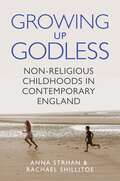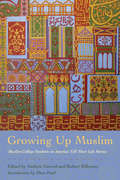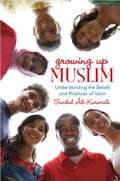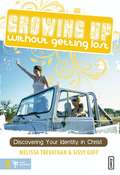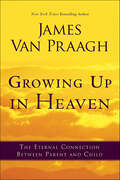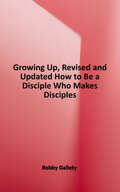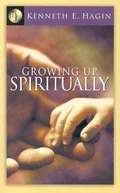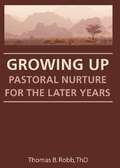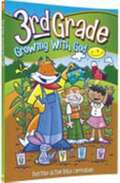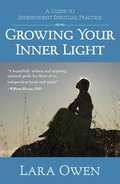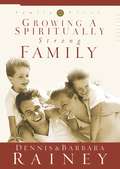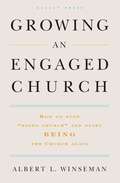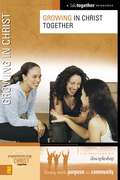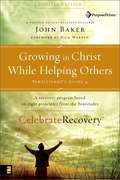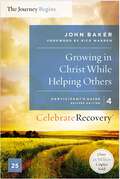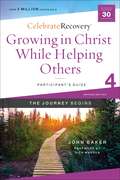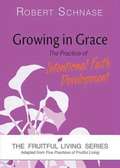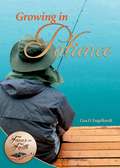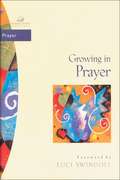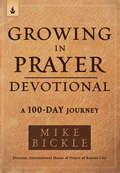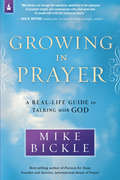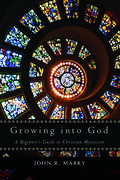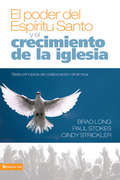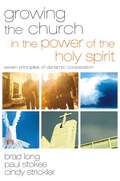- Table View
- List View
Growing Up Godless: Non-Religious Childhoods in Contemporary England
by Anna Strhan Rachael ShillitoeHow children&’s non-belief and non-religion are formed in everyday lifeThe number of those identifying as &“non-religious&” has risen rapidly in Britain and many other parts of Europe and North America. Although non-religion and non-belief are especially prevalent among younger people, we know little about the experience of children who are growing up without religion. In Growing Up Godless, Anna Strhan and Rachael Shillitoe fill this scholarly gap, examining how, when, where, and with whom children in England learn to be non-religious and non-believing. Drawing on in-depth interviews and extensive ethnographic fieldwork with children, their parents, and teachers, Strhan and Shillitoe offer a pioneering account of what these children believe in and care about and how they navigate a social landscape of growing religious diversity.Moving beyond the conventional understanding of non-religion as merely the absence of religion, Strhan and Shillitoe show how children&’s non-religion and non-belief emerge in relation to a pervasive humanism—centering the agency, significance, and achievements of humans and values of equality and respect—interwoven in their homes, schools, media, and culture. Their findings offer important new insight into the rise and formation of non-religious identities and, more broadly, the ways that children&’s beliefs and values are shaped in contemporary society.
Growing Up Muslim: Muslim College Students in America Tell Their Life
by Andrew Garrod Robert Kilkenny Eboo Patel"While 9/11 and its aftermath created a traumatic turning point for most of the writers in this book, it is telling that none of their essays begin with that moment. These young people were living, probing, and shifting their Muslim identities long before 9/11. . . . I've heard it said that the second generation never asks the first about its story, but nearly all the essays in this book include long, intimate portrayals of Muslim family life, often going back generations. These young Muslims are constantly negotiating the differences between families for whom faith and culture were matters of honor and North America's youth culture, with its emphasis on questioning, exploring, and inventing one's own destiny. "--from the Introduction by Eboo Patel In Growing Up Muslim, Andrew Garrod and Robert Kilkenny present fourteen personal essays by college students of the Muslim faith who are themselves immigrants or are the children of immigrants to the United States. In their essays, the students grapple with matters of ethnicity, religious prejudice and misunderstanding, and what is termed Islamophobia. The fact of 9/11 and subsequent surveillance and suspicion of Islamic Americans (particularly those hailing from the Middle East and the Asian Subcontinent) have had a profound effect on the lives of these students. The shift in official policies and everyday habits that occurred subsequent to the attacks on New York and Washington D. C. has had an influence on the lives of these undergraduates, their families, and their communities of origin.
Growing Up Muslim: Understanding Islamic Beliefs and Practices
by Sumbul Ali-KaramaliAuthor Sumbul Ali-Karamali offers her personal account, discussing the many and varied questions she fielded from curious friends and schoolmates while growing up in Southern California--from diet, to dress, to prayer and holidays and everything in between. She also provides an academically reliable introduction to Islam, addressing its inception, development and current demographics.Through this engaging work, readers will gain a better understanding of the everyday aspects of Muslim American life, to dispel many of the misconceptions that still remain and open a dialogue for tolerance and acceptance.
Growing Up Without Getting Lost
by Melissa Trevathan Helen Stitt GoffThere was a time, not so long ago, when everything in life seemed pretty simple. You had great friends, you got along with your parents (most of the time!), and you were pretty happy with the way your life was. But suddenly, it seems like everything is changing. Your friends expect way too much from you, and often let you down. You fight with your parents more than you’d like, and they never seem to be happy with you. You just don’t understand why your life seems so chaotic now. Melissa and Sissy, the authors of this book, think they can help you figure out some of the big questions inundating your mind: • Who am I? • What do I want? • What should I do? • Who do I want to be? While they’re no longer teenagers, Melissa and Sissy remember a bit about their entry into teenage life. But more than that, they talk with girls who are a lot like you every day—girls who are feeling pressure from everyone around them, who are feeling like they’re changing in ways they don’t understand—physically, emotionally, and spiritually—and they feel like their lives are out of their own control. If you’ve ever asked yourself any of those questions above, or if you just don’t know why you feel like everything is changing and you miss the “good old days” of Barbies and board games, this book can help you understand who you are and give you hope for who you are becoming.
Growing Up in Heaven: The Eternal Connection Between Parent and Child
by James Van Praagh“[JamesVan Praagh] has changed people’s lives, banished thefear of death, and brought grieving parents the solace of their dead children’spresence . . . It is impossible not to be moved.” —Newsweek “Hereally is a healer. . . . He is the real thing.” —Shirley MacLaineWorld-renownedpsychic James Van Praagh reveals the truth aboutchildren in the afterlife, verifying that their spirits remain enduringlyconnected to the world of the living even from the great hereafter. In GrowingUp in Heaven, the New York Times bestselling author of GhostsAmong Us and Unfinished Business offers a heartwarming, visionaryconfirmation of our deepest hopes and wishes for the children who have goneahead of us to their great reward.
Growing Up, Revised and Updated: How to Be a Disciple Who Makes Disciples
by Robby GallatyIf you are serious about being a disciple of Jesus Christ, a discipleship group can help you achieve that goal. Jesus established this model by forming and leading the first discipleship group--and it worked. The men who emerged from that group took the gospel to the world and ultimately laid down their lives for Christ. Growing Up: How to Be a Disciple Who Makes Disciples offers a manual for making disciples, addressing the what, why, where, and how of discipleship. Robby Gallaty, pastor of Long Hollow Baptist Church and founder and president of Replicate Ministries, teaches you how to utilize D-Groups to grow your relationship with God, how to defend your faith, and how to guide others in their relationships with God.
Growing Up, Spiritually
by Kenneth E. HaginRev. Hagin compares stages of spiritual growth to those of physical growth. It will help you locate where you are spiritually and then show you how to grow into the next stage of spiritual development.
Growing Up: Pastoral Nurture for the Later Years
by William M Clements Thomas B RobbGrowing Up: Pastoral Nurture for the Later Years is a sensitive volume devoted to helping older adults retain their status as meaningful members of their congregations and communities. In an honest approach, based on the foundations that old age is supposed to happen, the future belongs to the old, and vocation for people of faith is lifelong, Thomas Robb provides personal and Biblical perspectives, as well as research from over 20 years as a pastor, on the life process and the feelings, worries, and expectations accompanying growing up and growing old. He then molds these concerns into a challenge for congregations and their spiritual leaders to actively assist the aged in coping with and overcoming fears and barriers limiting the fullest expression of faith in God. This insightful book describes the tasks and suggests programs for pastors and congregations everywhere in meeting the challenge, making life for the aged more than shuffleboard and bingo, pot-luck dinners and day trips. Dimensions of pastoral ministries that nurture women and men who, at midlife and beyond, seek to find their way through the unexpected and unplanned, through the third of life following parenthood and careers, are described in detail. Pastors, church leaders, congregations, professors of courses in ministry and aging, aging church members, and seminary students will benefit immensely from the wealth of information presented in Growing Up: Pastoral Nurture for the Later Years.
Growing With God: Student Manual
by Positive Action for ChristTeaches students about God through the stories and activities centered around the lives of major Bible characters. Designed to challenge the student's heart and head.
Growing Your Inner Light: A Guide to Independent Spiritual Practice
by Lara OwenTruly a beginners guide to creating a daily spiritual practice, Growing Your Inner Light is a handbook that gives practical advice on following a spiritual path that's right for you. Lara Owen gives readers the freedom to integrate from different traditions-and develop new ones-to enrich their own lives. As Owen writes, spiritual development is a natural part of being human, and a way to grow the intensity of their inner light throughout life. Intended to be read over the course of a year, each chapter gives an action plan for integrating a new spiritual element into the everyday. As more and more seekers make the jump from religion to spirituality, this book appeals to everyone who wants a personal spiritual path that nourishes them in a deep and lasting way.
Growing a Spiritually Strong Family (Family First #1)
by Barbara Rainey Dennis RaineyDoes God have plans for your family beyond accumulating stuff in a large house in a nice suburb? How can moms and dads establish a home where God's presence blesses each relationship and biblical principles shape the future? Brief chapters written by popular radio personalities Dennis and Barbara Rainey -- such as "Pray with Your Mate," "Train Your Disciples," "Sink Your Roots," and "Give Your Children You" -- set out a clear, workable master plan for a dynamic, God-pleasing family. This and future titles in the series will deliver down-to-earth advice, encouraging stories, timely insights, and life-changing truths for leaving a godly family legacy.
Growing an Engaged Church: How to Stop "Doing Church" and Start Being the Church Again
by Albert L. WinsemanGrowing an Engaged Church offers unique, research-based, often counterintuitive solutions to the challenges facing churches today, including declining congregant participation, decreasing contributions, and slumping membership. Ministers, priests, and church boards will find the evidence and answers in this book provocative, eye-opening, and, most importantly, actionable.What if members of your congregation . . . • were 13 times more likely to have invited someone to participate in your church in the past month? • were three times as satisfied with their lives? • spent more than two hours per week serving and helping others in their community? • tripled their giving to your church? What would your church — your parish — look like? And how would you go about creating this kind of change? One thing is certain: Church leaders are never going to inspire more people to be actively and passionately involved in their congregations by doing the same things over and over again. Pastors and lay leaders need something fresh. Something new. The last thing they need is “just another program” or to set up a laundry list of new activities for members. Based on solid research by The Gallup Organization, Growing an Engaged Church will appeal to both Protestant and Catholic clergy and lay leaders who are looking for a way to be the Church instead of just “doing church.”
Growing in Christ (Experiencing Christ Together)
by Brett Eastman Dee EastmanOur world these days is so hectic, so complex. Where do we turn for wisdom and guidance in navigating the ins and outs of life? There are many voices to listen to and many examples to follow, but we really need look no further than the Author of Life, Jesus. He taught and lived a way of life that was purposeful and pleasing to God. These six sessions will show you the value and the nature of a life of discipleship, as modeled by Jesus.Experiencing Christ Together helps your group explore the five biblical purposes that make up a high-impact Christian life —fellowship, discipleship, ministry, evangelism, and worship. Jesus perfectly lived out God’s purposes for his life, and he taught his followers how to do the same. As you walk in the footsteps of those first disciples by listening to and watching Jesus through these studies, you and your group will be transformed. One small group leader put it this way: “The Experiencing Christ Together series has motivated me more than any other Bible study that I have ever been to. This Bible study gets to the heart of the matter—my character in Christ—and that has created action on my part.”
Growing in Christ While Helping Others Participant's Guide 4
by John BakerA Program for Implementing a Christ-Centered Recovery Ministry in Your Church Alcoholism - Divorce - Sexual Abuse - Codependency - Domestic Violence - Drug Addiction - Sexual Addiction - Food Addiction - Gambling Addiction and many more! There is a way the church can help the hurting move beyond their wounds to experience the healing and forgiveness of Christ. Since 1991, more than 200,000 people have participated in the Celebrate Recovery programs offered at more than 3,500 churches, prisons, and rescue missions. Drawn from the Beatitudes, Celebrate Recovery helps people resolve painful problems in the context of the church as a whole. Newly updated, the kit includes: •1 20-minute DVD introductory guide for leaders •1 leader’s guide •1 of each participant’s guide (4 total) •CD-ROM with 25 lessons •CD-ROM with sermon transcripts and reproducible promotional materials •4-volume audio CD sermon series “And then there’s pastor John Baker, the founder of Celebrate Recovery… Big John and I shared something in common. We used to drink too much. And our hearts changed, and then we quit. That is a tried-and-true formula. The problem is government is not good at changing hearts. But people like John Baker have been good about it and successful doing that.” —President George W. Bush on Celebrate Recovery and its founder, John Baker, at the Faith- Based and Community Initiatives Conference, March 3, 2004.
Growing in Christ While Helping Others Participant's Guide 4: A Recovery Program Based on Eight Principles from the Beatitudes (Celebrate Recovery)
by John BakerThe Celebrate Recovery Participant&’s Guides are essential tools for the personal recovery journey. In the seven lessons in Guide 4: Growing in Christ While Helping Others, you will work through the final two principles on the road to recovery. More than just maintenance, these principles will help you prevent relapse and give you the necessary tools to help others in their recovery process.8 Reserve a daily time with God for self-examination. Bible reading and prayer in order to know God and his will for my life and to gain the power to follow his will.9 Yield myself to God to be used to bring this Good News to others, both by my example and by my words. "Happy are those who are persecuted because they do what God requires" (Matthew 5:10).By working through the lessons and exercises found in each of the four Participant&’s Guides you will begin to experience the true peace and serenity you have been seeking, restore and develop stronger relationships with others and with God, and find freedom from life&’s hurts, hang-ups, and habits.All the scriptures have been updated to the new NIV 2011 version.
Growing in Christ While Helping Others Participant's Guide 4: A Recovery Program Based on Eight Principles from the Beatitudes (Celebrate Recovery)
by John BakerThe Celebrate Recovery Participant's Guides are essential tools for the personal recovery journey. In the seven lessons in Guide 4: Growing in Christ While Helping Others, you will work through the final two principles on the road to recovery. More than just maintenance, these principles will help you prevent relapse and give you the necessary tools to help others in their recovery process.7 Reserve a daily time with God for self-examination. Bible reading and prayer in order to know God and his will for my life and to gain the power to follow his will.8 Yield myself to God to be used to bring this Good News to others, both by my example and by my words. "Happy are those who are persecuted because they do what God requires" (Matthew 5:10).By working through the lessons and exercises found in each of the four Participant's Guides you will begin to experience the true peace and serenity you have been seeking, restore and develop stronger relationships with others and with God, and find freedom from life's hurts, hang-ups, and habits. All the scriptures have been updated to the new NIV 2011 version.
Growing in Grace: The Practice of Intentional Faith Development (The Fruitful Living Series)
by Robert SchnaseSince the publication of Five Practices of Fruitful Congregations, these five practices have helped hundreds of congregations understand their mission, renew ministries, and stretch toward fruitfulness and excellence for the purpose of Christ. Now, each of the five practices has been broken out into 4-week small group studies that provide an honest, practical, and winsome guide to the spiritual journey. In Growing in Grace: The Practice of Intentional Faith Development we do the soul work that connects us to others, immerses us in God’s Word, and positions us to grow in grace and mature in Christ. We learn in community.
Growing in Patience
by Lisa O EngelhardtMany of us are impatient; the responsibilities and hardships of life seem to try our patience at every turn. And sometimes, it’s the little things that make us snap. However, scripture tells us that “God is faithful, and he will not let you be tested beyond your strength, but with the testing he will also provide the way out so that you may be able to endure it” (1 Corinthians 10:13). With those wise and hopeful words in mind, Growing in Patience presents positive, productive, and spiritual ways to deal with impatience. After all, patience must be nurtured. It is a virtue we must prayerfully ask for from God and then—by God’s grace—seek to put into practice each day.
Growing in Prayer
by Luci Swindoll Janet Kobobel GrantThe Women of Faith Bible Study Series helps you turn the laughter and lessons of Women of Faith conferences into a journey of growth shared by special friends. Whether or not you've attended a conference, you will appreciate the bonds that form as you join with other women linked together in friendship, prayer, joy, and faith. Each study will also lead you to a deeper love of the Bible and a greater appreciation of the power of God's Word. Each session included six sections: - A Moment for Quiet Reflection - Knowing God's Heart - Friendship Boosters - Just for Fun - Praying Together - Making It Real in Your Own Life. The leaders' guide that's included makes it easy to facilitate weekly Bible studies that will nurture your knowledge of Scripture and your sense of God's presence in your life.
Growing in Prayer Devotional: A 100-Day Journey
by Mike BickleWhat would your world look like if you prayed every day? Every believer who sincerely desires an intimate relationship with God must discover the transformational power of prayer. This one-hundred-day devotional, inspired by Mike Bickle&’s best-selling book Growing in Prayer, will give readers daily inspiration, knowledge, and guidance to help them cultivate deeper intimacy with God through prayer. Each day contains a quote on prayer from a classic Christian author, a passage from a chapter in Growing in Prayer for reflection, a Scripture verse or reference, a prayer starter, a suggestion for practical application of the principle being taught, and lines for journaling. This devotional will help energize a prayer life that has become routine, stale, or nonexistent and will be a welcome resource for believers who desire to grow in prayer.
Growing in Prayer: A Real-Life Guide to Talking with God
by Mike BickleA practical, effective strategy for incorporating prayer into everyday life As the founder of the International House of Prayer, Mike Bickle has devoted his life to understanding and practicing the principles and power of prayer. In Growing in Prayer he combines his biblical study with his extensive experience on the topic to give you the tools you need to develop a stronger prayer life through a passionate commitment to your relationship with God. Start today! God is waiting to hear from you. He doesn&’t just love you, He really likes you and enjoys listening to you when you pray even in your weaknesses. You can be confident that your prayers are valuable to God and will make a difference in your world.
Growing into God
by John MabryFor many people, the word mysticism conjures up occult, secretive rituals held after midnight in some dark cave. But true mysticism isn't at all sinister or secretive, says author John Mabry, an Anglican-rite Congregational minister. In fact, mysticism is at the heart of an authentic Christian life. It is nothing more and nothing less than the pursuit-and enjoyment-of union with God, which is the goal of all Christian spirituality. Christian mysticism is the discipline of growing the soul into God-shedding illusory identities, deepening prayer, seeing God in all things, and acting as Christ in the world. Mabry's great passion is to bring theology to everyday life by explaining complex ideas in everyday language that anyone can understand and find useful. In Growing into God, he "demystifies" mysticism, providing a friendly and accessible entry point to some of the teachings, practices, and experiences of the Christian mystical tradition. Mabry explores the classic mystical journey, which begins with the Awakening of a unitive consciousness that experiences everything as Divine and interconnected. The journey continues with Purgation, in which we empty ourselves of illusion; Illumination, in which we begin to see God in all things and all things in God; and, finally, Union, in which we marry our lives with God's life. Our hands become God's hands, our lips become God's lips, our touch becomes God's touch, in order to bring help, comfort, and healing to the world.Along the way, and with an entertaining teacher's clarity, Mabry recounts the stories of many Christian mystics, including inspiring quotations. He also enriches each chapter with questions and answers to simplify points as well as experiential practices to help readers embark upon the mystical journey themselves.
Growing into God
by John R MabryFor many people, the word mysticism conjures up occult, secretive rituals held after midnight in some dark cave. But true mysticism isn't at all sinister or secretive, says author John Mabry, an Anglican-rite Congregational minister. In fact, mysticism is at the heart of an authentic Christian life. It is nothing more and nothing less than the pursuit-and enjoyment-of union with God, which is the goal of all Christian spirituality. Christian mysticism is the discipline of growing the soul into God--shedding illusory identities, deepening prayer, seeing God in all things, and acting as Christ in the world. Mabry's great passion is to bring theology to everyday life by explaining complex ideas in everyday language that anyone can understand and find useful. In Growing into God, he "demystifies" mysticism, providing a friendly and accessible entry point to some of the teachings, practices, and experiences of the Christian mystical tradition. Mabry explores the classic mystical journey, which begins with the Awakening of a unitive consciousness that experiences everything as Divine and interconnected. The journey continues with Purgation, in which we empty ourselves of illusion; Illumination, in which we begin to see God in all things and all things in God; and, finally, Union, in which we marry our lives with God's life. Our hands become God's hands, our lips become God's lips, our touch becomes God's touch, in order to bring help, comfort, and healing to the world.,p>Along the way, and with an entertaining teacher's clarity, Mabry recounts the stories of many Christian mystics, including inspiring quotations. He also enriches each chapter with questions and answers to simplify points as well as experiential practices to help readers embark upon the mystical journey themselves
Growing the Church in the Power of the Holy Spirit: Seven Principles of Dynamic Cooperation
by Brad Long Cindy Strickler Paul K. StokesDo the programs crowding the typical church’s weekly schedule today lack an essential element, one that is fundamental to their having the greatest spiritual impact? This biblically grounded book asserts that many leaders overlook the necessary precondition of discerning and cooperating with the empowering will of the Holy Spirit before putting their plans into action. Growing the Church in the Power of the Holy Spirit is a highly practical guide for nurturing relations between believers and the Holy Spirit, a process facilitated by seven dynamics. • Love that draws us into engagement • Faith and obedience • Receiving divine guidance • Exercising spiritual discernment • Welcoming the gifts and manifestations of the Holy Spirit • Intercessory prayer that shapes the future • Seeing and responding to kairos moments Advanced by the church leadership and brought into being by the Holy Spirit, these factors help congregations preach and teach, worship, heal, govern, make disciples of converts, and evangelize. One of this book’s strengths is the use of case studies to illustrate how the seven dynamics can take root in local congregations.
Growing the Church in the Power of the Holy Spirit: Seven Principles of Dynamic Cooperation
by Brad Long Cindy Strickler Paul K. StokesIs something crucial missing from your congregation's programs?Beneath the surface of churches' programs and activities lies the fundamental question of how leaders and churches can be enabled to discern and obediently cooperate with the guidance of the Holy Spirit.This biblically grounded book asserts that many leaders overlook the necessary precondition of cooperating with the empowering will of the Holy Spirit before putting their plans into action. Growing the Church in the Power of the Holy Spirit is a highly practical guide for nurturing relations between believers and the Holy Spirit, a process facilitated by seven dynamics:Love that draws us into engagementFaith and obedienceReceiving divine guidanceExercising spiritual discernmentWelcoming the gifts and manifestations of the Holy SpiritIntercessory prayer that shapes the futureSeeing and responding to kairos momentsAdvanced by the church leadership and brought into being by the Holy Spirit, these factors help congregations preach and teach, worship, heal, govern, make disciples of converts, and evangelize.
